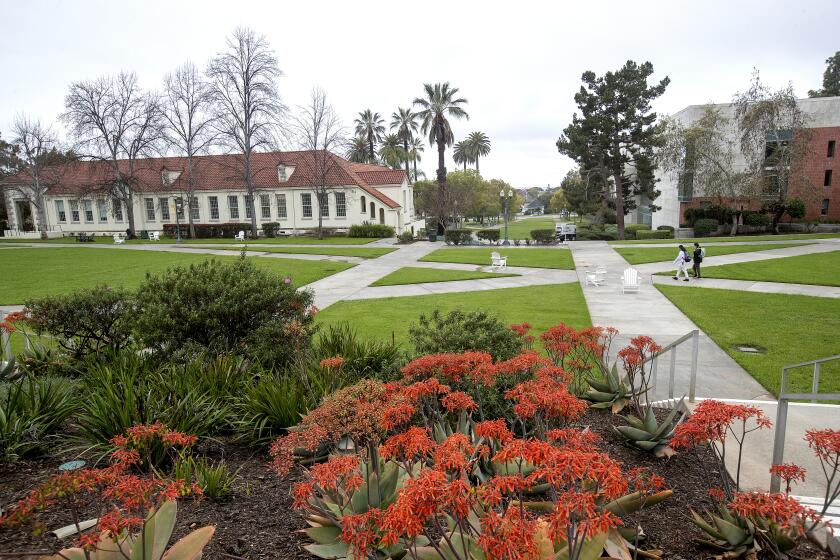Commentary: Rethinking how schools address the mental health epidemic

- Share via
We are almost a decade into the largest epidemic of youth mental illness ever recorded. This tragedy has resulted in large increases in youth anxiety, depression, self-harm and suicide. While this should be a moment of great humility for California school districts, they are responding to this crisis with the same dogmatism, certainty and ideology that led to the disastrous school closures during the pandemic.
In 2016, the Collaborative for Academic, Social, and Emotional Learning (CASEL) launched its Collaborating States Initiative (CSI) to support statewide efforts to implement Social and Emotional Learning (SEL) programs. California joined CASEL’s initiative and began promoting CASEL SEL programs to state education agencies, including the Orange County Department of Education.
The wheels were set in motion for statewide SEL implementation before COVID-19 reached our shores; however, school boards and district administrators opportunistically used the pandemic’s impact on students to generate buy-in from parents and community groups. Many local school districts have recently spent taxpayer funds to purchase, train and implement such programs, including Ruler Approach at Newport-Mesa Unified and Second Step in Irvine.
Today, these programs do not come with the mission to improve the mental health of children. In 2020, CASEL updated its definition of SEL to “Transformative SEL” which aims to transform inequitable systems by disrupting “dominant cultures of individualism.” In other words, the mission of these programs is to prime students’ minds for social justice indoctrination. CASEL SEL programs do this by focusing on two things: intersectional identity development and emotional safety. Unfortunately for our students, these concepts make mental health worse, not better.
First, CASEL SEL programs infuse social justice ideology into emotional intelligence lessons to train students to see others — and themselves — as members of distinct identity groups defined by immutable characteristics such as race, class and gender. This form of identity politics is rooted in a dim view of human agency that teaches students to have an external locus of control, meaning they have little individual agency over what happens to them and are subject to the power struggles of their identity group. Research shows that people with an external locus of control are more passive and more likely to become depressed vs. those with an internal locus of control who believe “they are the captain of their own ship.”
Second, CASEL SEL programs center “emotional safety” in classrooms by urging educators, who have the best of intentions, to focus on creating environments in which students “feel safe.” In their 2018 book “The Coddling of the American Mind,” Greg Lukianoff and Jonathan Haidt explore changes in childhood such as the rise of fearful parenting, the decline of unsupervised, child-directed play, and the new world of screens and social media that have engulfed children in the last decade. They argue that grossly expanded conceptions of “trauma” and “safety” have deprived young people of the challenges and stressors that their antifragile minds need to mature into capable adults who can engage productively with people and ideas that challenge them. These “safe” environments ultimately make students more fragile, anxious and prone to seeing themselves as victims who demand safe spaces and trigger warnings to protect themselves from speech and ideas they find harmful.
Recently, a handful of leaders at elite U.S. universities including the dean at Stanford Law School have acknowledged the problem of emotional fragility and reclaimed the notion that the way to defeat bad ideas is by exposure, argument and persuasion, not by trying to silence or wish them away. This semester, the student government at my alma mater, Cornell University, voted unanimously to put trigger warnings on the school’s syllabus for any course containing content that might be viewed as “traumatic.” Thankfully, President Martha Pollock swiftly vetoed it saying, “Learning to engage with difficult and challenging ideas is a core part of a university education.”
Daily Pilot columnist Patrice Apodaca explores the drop in college enrollment, especially in pursuit of liberal arts degrees.
Primary and secondary education should follow suit: Instead of centering “emotional safety” in classrooms and pathologizing common childhood struggles with an army of mental health counselors, administrators and educators should center the liberal ideal of “freedom” in the classroom. Students should be free to respectfully speak, feel and believe as they see fit, with viewpoint diversity celebrated and encouraged. By exposing students to diverse views, celebrating intellectual curiosity and modeling empathy towards differences, educators can teach students to build bridges by focusing on a shared humanity instead of group identity.
While mental health counselors should be trained and available to assist with extreme cases of distress such as suicide ideation; the philosophy of “universal mental health support” for all students needs to be reconsidered. What are we doing to our students if we teach them to expect “safety” everywhere they go and encourage them to develop extra-thin skin just before they leave the cocoon of adult protection? Hanna Holborn Gray, the president of the University of Chicago from 1978 to 1993, once said, “Education should not be intended to make people comfortable; it is meant to make them think.”
I urge Orange County school districts to eschew SEL programs being promoted by the state of California and its partnership with CASEL. Instead, school boards should form community working groups comprised of parents, community leaders, mental health professionals and educators to explore the multifactorial reasons for the mental health decline of our students and propose innovative solutions that boost antifragility, reduce screen time and increase opportunities for unstructured social interaction.
At the last NMUSD school board meeting, Corona del Mar student body president, TJ Rokos, highlighted a fun event at school that took students off their phones and brought them out of their cars during lunch: “The phones, I’m just over it,” he said, “[they] have to go at school … We need to make our kids social again.” I think he may be on to something!
Rebeka Sinclair is a former shareholder activist who specialized in corporate governance at publicly traded companies. She is now an educational researcher, writer and proud mother of four young children in Newport Beach.
All the latest on Orange County from Orange County.
Get our free TimesOC newsletter.
You may occasionally receive promotional content from the Daily Pilot.






